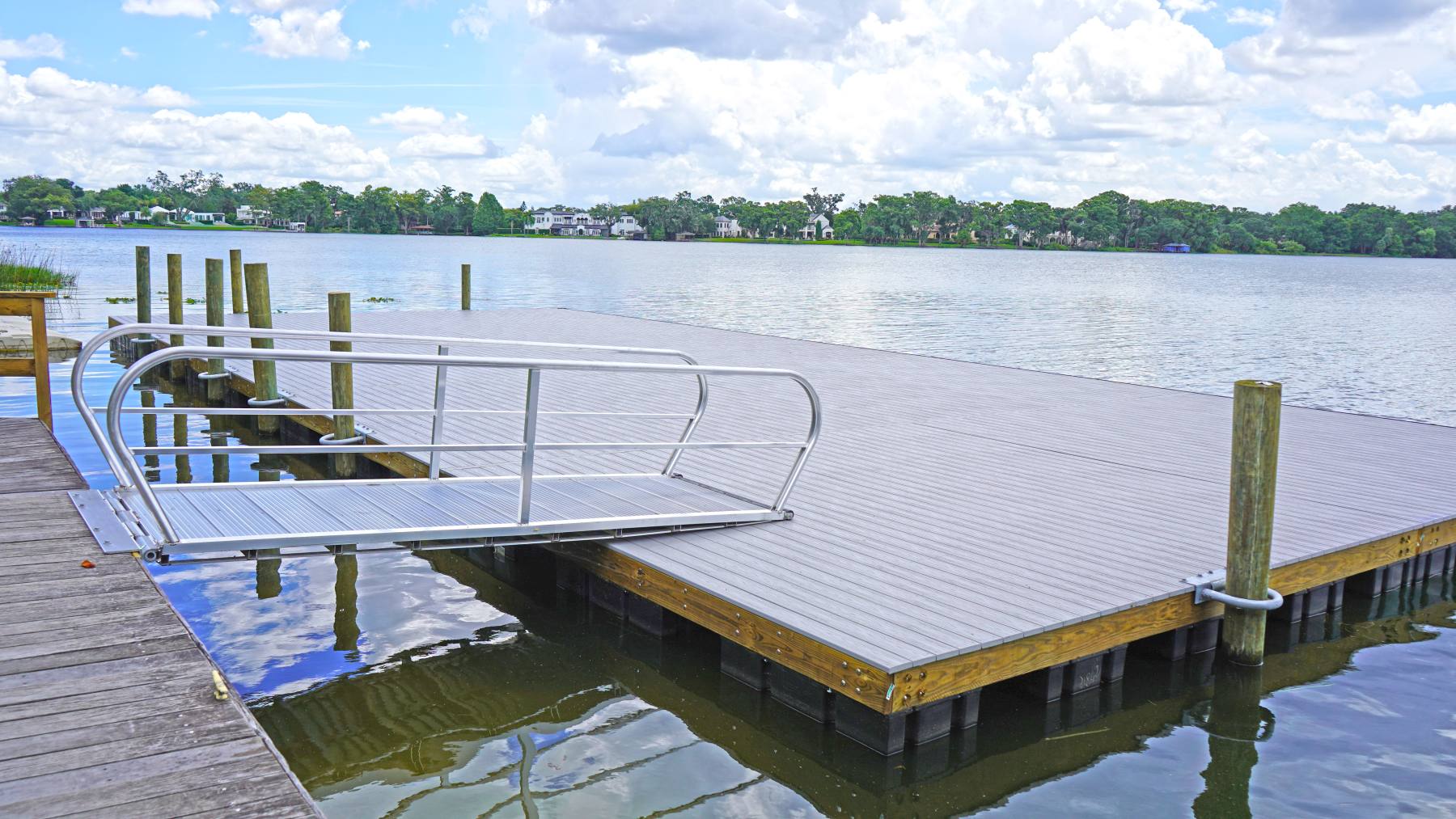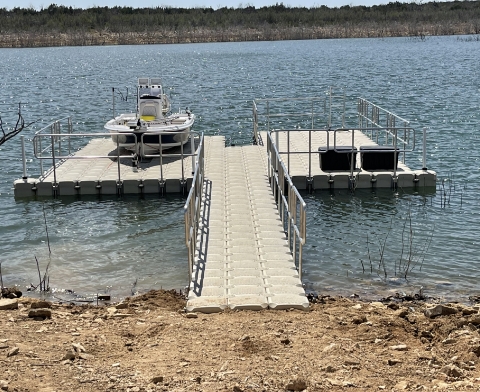Improve Your Water Experience with Custom-made Floating Docks Designed for Your Way of living
Improve Your Water Experience with Custom-made Floating Docks Designed for Your Way of living
Blog Article
The Ultimate Guide to Choosing the very best Floating Docks
Selecting the suitable floating dock calls for a comprehensive understanding of different aspects that affect both efficiency and long life. Factors such as dock types, materials, and vital functions dramatically influence your decision-making procedure.
Understanding Floating Dock Types
When selecting a floating dock, it is important to recognize the numerous kinds readily available, as each offers distinct purposes and applications. Floating docks primarily fall under 3 categories: modular, stationary, and pontoon docks.
Modular docks are composed of individual sections that can be easily put together or reconfigured, making them excellent for transforming water degrees and varied usages, such as recreational activities or industrial operations. Their versatility enables for modification based upon details demands.

Pontoon docks are characterized by their resilient framework, typically made up of several pontoons that give stability and support. They are particularly well-suited for bigger vessels and are typically made use of in marinas or for waterside buildings. Recognizing these kinds help in selecting the most proper floating dock to meet specific requirements, guaranteeing ideal functionality and safety.
Trick Products for Toughness
Picking the right materials for floating docks significantly impacts their toughness and long life. The most common materials include wood, plastic, metal, and composite products, each offering distinctive benefits and constraints.
Timber, frequently favored for its visual appeal, needs regular maintenance to endure wetness and decay. Pressure-treated lumber can improve resistance to rot, however it may still be prone to parasites and weathering.

Plastic docks, made from high-density polyethylene (HDPE), are resistant to corrosion, UV radiation, and influence, making them a prominent choice for seaside environments. Their light-weight nature likewise helps with very easy setup and relocation.
Steel docks, commonly built from light weight aluminum or galvanized steel, supply extraordinary strength and durability. They are immune to corrosion, particularly when treated, yet may need additional insulation to avoid warm build-up in warm environments.
Composite materials, incorporating wood fibers and plastics, supply the advantages of both wood and plastic, standing up to moisture and fading while calling for minimal maintenance. - floating docks
Eventually, the selection of materials need to align with environmental problems, intended use, and upkeep choices to guarantee the floating dock continues to be practical and cosmetically pleasing over time.
Necessary Features to Consider
While the option of products is critical, taking into consideration necessary features for floating docks is similarly vital to ensure optimum performance and customer contentment. One key attribute to analyze is the dock's buoyancy capability, which establishes just how much weight it can support without submerging. floating dock builder. This is important for fitting watercrafts, individual watercraft, and even recreational activities
Additionally, portability is a considerable factor to consider. Relying on your requirements, you might desire a dock that is simple to take apart and deliver, specifically if you intend to move it seasonally. Security is one more vital function; a well-designed floating dock should minimize activity caused by wind and water currents, giving a secure platform for customers.
Safety and security functions, such as non-slip surfaces and rounded edges, are also critical to avoid crashes, specifically in wet conditions. Take into consideration the schedule of accessories, such as Bonuses cleats, bumpers, and ladders, which can enhance the capability of your dock.
Setup and Maintenance Tips
Establishing up and maintaining a floating dock calls for mindful preparation and attention to information to guarantee its long life and ideal performance. Begin discover this by selecting an ideal location that decreases exposure to solid currents and waves, which can cause damage. Guarantee that the water depth suffices for the dock's elevation which it is anchored firmly to stop activity.
During setup, follow the supplier's guidelines carefully, as inappropriate assembly can jeopardize security. Use high-grade materials immune to corrosion, such as aluminum or dealt with timber, to improve durability. Consistently examine all elements, consisting of floats, ports, and securing systems, for indicators of damage or wear.
Maintenance is critical for extending the life of your dock. Clean the surfaces regularly to stop algae accumulation and look for any type of loose fittings that may need tightening. If your dock utilizes flotation protection devices, ensure they stay undamaged and cost-free from leaks. Furthermore, take into consideration using safety coatings to wood parts to lower weathering results. By sticking to these installment and upkeep pointers, you can appreciate a useful and dependable floating dock for several years to come.
Budgeting for Your Dock
Budgeting for your dock is a vital action that can significantly influence your total contentment and financial investment in a waterside residential property. Establishing a clear budget aids you browse the various alternatives offered and ensures you make educated decisions that straighten with your economic abilities.
Begin by determining the dimension and design of the dock you call for, as these aspects will greatly affect the cost. Floating docks can vary significantly in cost, depending on products, buoyancy, and features like ramps and accessories. Research various producers and distributors to contrast rates and comprehend the marketplace value.
In enhancement to preliminary prices, think about recurring costs such as upkeep, insurance coverage, and possible repair work. Allot funds for these repeating prices to avoid surprises down the line. It's likewise sensible click over here to budget for any type of essential permits or examinations, which may be needed by regional laws.
Lastly, bear in mind the possible roi. A well-planned dock can improve your residential or commercial property's worth and allure, providing a favorable monetary influence in the long-term. By budgeting properly, you can guarantee that your dock satisfies your needs without compromising your financial stability.
Verdict
In conclusion, choosing the optimal floating dock demands a complete examination of various variables, including dock kinds, products, vital features, and installment processes. Mindful consideration of financial restrictions will certainly additionally guarantee an audio investment.

While the option of materials is vital, considering important functions for floating docks is just as vital to ensure optimal performance and user complete satisfaction.Establishing up and preserving a drifting dock calls for mindful preparation and focus to information to guarantee its long life and optimum efficiency. Floating docks can differ dramatically in rate, depending on products, buoyancy, and attributes like devices and ramps.In verdict, picking the suitable floating dock demands a thorough evaluation of various variables, consisting of dock kinds, products, vital functions, and setup procedures.
Report this page